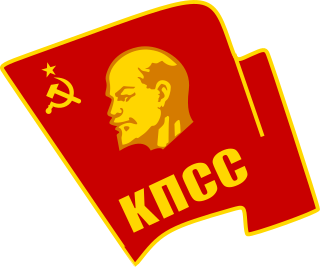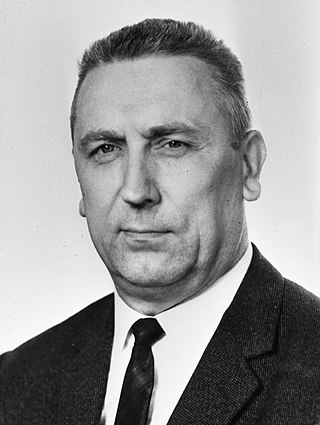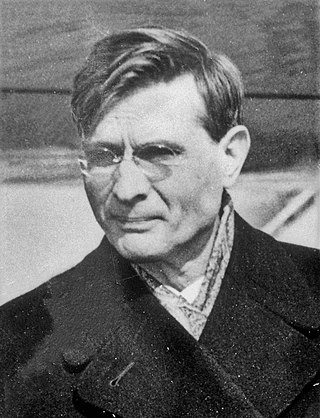
The Communist Party of the Soviet Union (CPSU), at some points known as the Russian Communist Party (Bolsheviks) and All-Union Communist Party (Bolsheviks), sometimes referred to as the Soviet Communist Party (SCP), and formerly known as the Bolshevik Party, was the founding and ruling political party of the Soviet Union. The CPSU was the sole governing party of the Soviet Union until 1990 when the Congress of People's Deputies modified Article 6 of the 1977 Soviet Constitution, which had previously granted the CPSU a monopoly over the political system. The party's main ideology was Marxism-Leninism.

Konstantin Ustinovich Chernenko was a Soviet politician and the seventh General Secretary of the Communist Party of the Soviet Union. He briefly led the Soviet Union from 1984 until his death a year later.

Leonid Ilyich Brezhnev was a Soviet politician who served as General Secretary of the Communist Party of the Soviet Union from 1964 until his death in 1982, and Chairman of the Presidium of the Supreme Soviet from 1960 to 1964 and again from 1977 to 1982. His 18-year term as General Secretary was second only to Joseph Stalin's in duration. To this day, the value of Brezhnev's tenure as General Secretary remains debated by historians. While his rule was characterized by political stability and significant foreign policy achievements, it was also marked by corruption, inefficiency, economic stagnation, and rapidly growing technological gaps with the West.

The Socialist Unity Party of Germany, informally known in English as the East German Communist Party, was the founding and ruling party of the German Democratic Republic from the country's foundation in October 1949 until its dissolution after the Peaceful Revolution in 1989. It was a Marxist–Leninist communist party, established in April 1946 as a merger between the East German branches of the Communist Party of Germany and Social Democratic Party of Germany.

Edward Gierek was a Polish Communist politician and de facto leader of Poland between 1970 and 1980. Gierek replaced Władysław Gomułka as First Secretary of the ruling Polish United Workers' Party (PZPR) in the Polish People's Republic in 1970. He is known for opening communist Poland to the Western Bloc and for his economic policies based on foreign loans. He was removed from power after labor strikes led to the Gdańsk Agreement between the communist state and workers of the emerging Solidarity free trade union movement.

Andrei Pavlovich Kirilenko was a Soviet statesman from the start to the end of the Cold War. In 1906, Kirilenko was born at Alexeyevka in Belgorod Oblast to a Ukrainian working-class family. He graduated in the 1920s from a local vocational school, and again in the mid-to-late 1930s from the Rybinsk Aviation Technology Institute. He became a member of the All-Union Communist Party (Bolsheviks) in 1930. As many like him, Kirilenko climbed up the Soviet hierarchy through the "industrial ladder"; by the 1960s, he was vice-chairman of the Bureau of the Central Committee of the Russian Soviet Federative Socialist Republic (RSFSR). After Nikita Khrushchev's forced resignation, Kirilenko became Leonid Brezhnev's "chief lieutenant" within the Central Committee.

Mikhail Andreyevich Suslov was a Soviet statesman during the Cold War. He served as Second Secretary of the Communist Party of the Soviet Union from 1965, and as unofficial chief ideologue of the party until his death in 1982. Suslov was responsible for party democracy and power separation within the Communist Party. His hardline attitude resisting change made him one of the foremost orthodox communist Soviet leaders.

Yumjaagiin Tsedenbal was a Mongolian politician who served as the leader of the Mongolian People's Republic from 1952 to 1984. He served as general secretary of the Mongolian People's Revolutionary Party from 1940 to 1954 and again from 1958 to 1984, chairman of the Council of Ministers from 1952 to 1974, and chairman of the Presidium of the People's Great Khural from 1974 to 1984.

Nikolai Viktorovich Podgorny was a Soviet statesman who served as the Chairman of the Presidium of the Supreme Soviet, the head of state of the Soviet Union, from 1965 to 1977.

Alexei Nikolayevich Kosygin was a Soviet statesman during the Cold War. He served as the Premier of the Soviet Union from 1964 to 1980 and was one of the most influential Soviet policymakers in the mid-1960s along with General Secretary Leonid Brezhnev.

Petro Yukhymovych Shelest was a Ukrainian Soviet politician. First Secretary of the Communist Party of the Ukrainian Soviet Socialist Republic, a member of the Politburo of the Communist Party of the Soviet Union and a deputy of the Supreme Soviet of the Ukrainian SSR.

The 26th Congress of the Communist Party of the Soviet Union opened on February 23, 1981, with a five-hour address by the General Secretary of the Communist Party and the chairman (president) of the Presidium of the Supreme Soviet Leonid Brezhnev. This was the last Congress for Brezhnev, who died in 1982. Brezhnev proposed another round of arms control talks. At a time when an aging Soviet leadership faced a decline in economic growth, severe food problems at home, grave uncertainties about its future relationship with the United States, and unsettling events in Poland, the congress ended its week of speeches by unanimously confirming the existing leadership. The congress elected the 26th Central Committee.

The Presidium of the 22nd Congress of the Communist Party of the Soviet Union (CPSU) was in session from 1961 to 1966. CPSU First Secretary Nikita Khrushchev chaired the Presidium from 1961 to 1964; Leonid Brezhnev succeeded him that year and chaired it until 1966. In contrast to full members, candidate members of the Presidium could not vote during Presidium sessions. It was normal that a full member of the Presidium had previously served as a candidate member, but this was not always the case. During the term 23 people held seats in the Presidium: 14 full members and 9 candidate members. One candidate member was promoted to full membership in the Presidium during the term. Not a single Presidium member died during this period while retaining office.
The Tenth Five-Year Plan, or the 10th Five-Year Plan of the Union of Soviet Socialist Republics (USSR), was a set of goals designed to strengthen the country's economy between 1976 and 1980. The plan was presented by the Chairman of the Council of Ministers Alexei Kosygin at the 25th Congress of the Communist Party of the Soviet Union (CPSU). Officially the plan was normally referred to as "The Plan of Quality and Efficiency".

The history of the Soviet Union from 1964 to 1982, referred to as the Brezhnev Era, covers the period of Leonid Brezhnev's rule of the Union of Soviet Socialist Republics (USSR). This period began with high economic growth and soaring prosperity, but gradually significant problems in social, political, and economic areas accumulated, so that the period is often described as the Era of Stagnation. In the 1970s, both sides took a stance of "detente". The goal of this strategy was to warm up relations, in the hope that the Soviet Union would pursue economic and democratic reforms. However, this did not come until Mikhail Gorbachev took office in 1985.

Collective leadership, or collectivity of leadership, was considered the ideal form of governance in the Union of Soviet Socialist Republics (USSR) and other socialist states espousing communism. Its main task was to distribute powers and functions among the Politburo and the Central Committee of the Communist Party of the Soviet Union, as well as the Council of Ministers, to hinder any attempts to create a one-man dominance over the Soviet political system by a Soviet leader, such as that seen under Joseph Stalin's rule. On the national level, the heart of the collective leadership was officially the Central Committee of the Communist Party. Collective leadership was characterised by limiting the powers of the General Secretary and the Chairman of the Council of Ministers as related to other offices by enhancing the powers of collective bodies, such as the Politburo.

The Political Bureau of the Central Committee of the Communist Party of the Soviet Union, or Politburo was the highest policy-making authority within the Communist Party of the Soviet Union and defacto a collective presidency of the USSR. It was founded in October 1917, and refounded in March 1919, at the 8th Congress of the Bolshevik Party. It was known as the Presidium from 1952 to 1966. The existence of the Politburo ended in 1991 upon the breakup of the Soviet Union.

The Central Committee of the Communist Party of the Soviet Union was the executive leadership of the Communist Party of the Soviet Union, acting between sessions of Congress. According to party statutes, the committee directed all party and governmental activities. Its members were elected by the Party Congress.
The Politburo of the 23rd Congress of the Communist Party of the Soviet Union was in session from 1966 to 1971.















